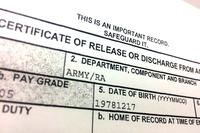A lot of people are thrown off by the paragraph comprehension section of the ASVAB. Here you are, cruising along, answering short, simple questions, and all of a sudden, you're hit in the face with lengthy sentences -- and often they're about boring subjects! Then you're told to answer numerous questions on each paragraph. It can seem overwhelming. Don't panic. Just keep in mind that the questions in this section are divided into four types.
A. Detail questions
A question might ask you about a detail from the paragraph you just read? in other words, a fact check. For example, in the following paragraph:
"Using bulldozers to slice bunkers and a helicopter landing pad out of a mountainside, U.S. special operations forces dug in Tuesday on a peak overlooking Pakistan, fortifying the area for the intensifying battle against al-Qaida and Taliban forces. Special operations forces -- who include Green Berets, Navy SEALs, and CIA operatives -- are playing a secretive but leading role in the battle against al-Qaida and Taliban suspects believed to be hiding out in the mountains of Pakistan's tribal areas."
You might be asked the following question about what you just read:
1. Which of the following is NOT being done by U.S. special operations forces?
- Building a helicopter landing pad
- Fortifying the area for battle
- Fighting against al-Qaida and Taliban rebels
- Hiding in Pakistan's tribal areas
The answer would be "D."
B. What's the point?
The second type of question is a general question about what you just read -- in other words, the summary.
If we use the paragraph above as an example once again, you might be asked:
2. The best title for this selection is:
- Rebels Have Not Been Caught
- Special Forces Prepare to Battle Rebels
- Building a Helicopter Pad
- Who's in Special Operations?
The answer would be "B." Note that almost all of the choices are true statements, but they aren't the focus of the paragraph. The main point is that Special Forces teams are digging in, preparing to attack the rebels.
C. Context and word meaning
Earlier we talked about synonyms and context. Here's where you get tested on them. As you know, words have different meanings, depending on how and where they're used (the context). Again, using the above paragraph as an example, answer this question:
3. In this paragraph's context, the word "leading" means:
- Principal
- In Front
- Popular
- Stellar
This one's a bit tricky; you could argue that "leading" means "in front" in this paragraph, but the paragraph also states that the special operations forces are "secretive," meaning they aren't on the front lines, but working behind the scenes. Thus, the correct answer would be "A," as "principal" also means "most important" or "main." See how the context and your knowledge of synonyms come into play?
D. Inference questions
To infer is to take the information that is given to you and come to a conclusion about what it means, even though you're not told directly. For example, if the weatherman says there's an 80% chance of rain tomorrow, you can infer that he's recommending you break out your umbrella.
Take this paragraph as an example:
"Within a few hours after it is born, a young wild horse can run fast enough to keep up with the herd. It is able to do this because its legs are long for its size -- almost as long as they will be when the horse is fully grown. If young horses could not run so soon after birth, they would be quickly eaten by predators. Usually, only one foal is born at a time. In the case of Mongolian wild horses, the coat of a newborn foal is often quite light in color. After four or five weeks, this is shed and replaced by a darker coat. Foals usually stay close to their mothers. When there is danger, they are moved to the center of the group and protected by all of the adults."
An inference question for this paragraph might go like this:
4. According to the author, young wild horses run fast soon after birth because:
- They have long legs
- They must escape predators
- All horses run fast
- It's easier for adult horses to protect them
This is a tricky one; you could argue that the answer is "A," because long legs help the horses run fast. This is true, but it doesn't explain why they run fast. The author suggests that if they don't run fast after birth, they will be caught by predators. Thus, the answer would be "B."
General Tips for Reading Comprehension
- The quick read. Read each paragraph quickly and get the essential details first. What is the main point being made?
- The closer look. Read the paragraph again, understanding all the information, and how it relates to the main point.
- Look at all questions and answers. Make sure you know exactly what you're being asked to answer. Small words like least, greatest, except, not, all, always, every, never, etc., in a question can change what you're being asked. For example, "What does the author always eat at dinner?" is very different from "What does the author never eat at dinner?" Also, read all the possible answers. Even if you think the answer to a question is "A" right off the bat, make sure to look at all the choices.
- No opinions. You may not agree with what the paragraph says. It doesn't matter. Don't let your opinions get in the way when you answer the questions. Base your answers only on what you've read, and not what you think, or something you read somewhere else.
- Fast and efficient. You are being timed, so don't get caught up if you're stuck on a question. If all else fails, guess and move on. In the actual ASVAB, you only can answer questions in order so give yourself time to answer all questions.
Interested in Joining the Military?
We can put you in touch with recruiters from the different military branches. Learn about the benefits of serving your country, paying for school, military career paths, and more: sign up now and hear from a recruiter near you.






